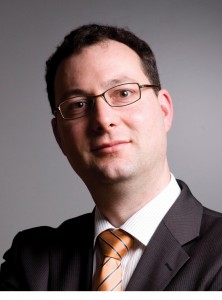 Patrick Theato studied chemistry at the University of Mainz (Germany) and the University of Massachusetts, Amherst (USA), and obtained his Ph.D. degree under the supervision of Prof. R. Zentel at the University of Mainz in 2001. In 2002, he was awarded a Feodor Lynen Postdoctoral Research Fellowship from the Humboldt Foundation and joined the group of Prof. D.Y. Yoon at Seoul National University (Korea), where he worked as a postdoctoral fellow, followed by a short research stay at Stanford University (USA) with Prof C.W. Frank. In 2003, he joined the University of Mainz as a young faculty member and completed his Habilitation in 2007. Since 2009 he holds a joint appointment with the School of Chemical and Biological Engineering at Seoul National University within the World Class University (WCU) program. In 2011 he accepted a prize senior lectureship at the University of Sheffield (UK). Shortly after he moved to University of Hamburg (Germany), accepting a tenured associate professorship for polymer chemistry. His current research interests include the defined synthesis of reactive polymers, block copolymers, design of multi stimuli-responsive polymers, versatile functionalization of interfaces, hybrid polymers, polymers for electronics and templating of polymers.
Patrick Theato studied chemistry at the University of Mainz (Germany) and the University of Massachusetts, Amherst (USA), and obtained his Ph.D. degree under the supervision of Prof. R. Zentel at the University of Mainz in 2001. In 2002, he was awarded a Feodor Lynen Postdoctoral Research Fellowship from the Humboldt Foundation and joined the group of Prof. D.Y. Yoon at Seoul National University (Korea), where he worked as a postdoctoral fellow, followed by a short research stay at Stanford University (USA) with Prof C.W. Frank. In 2003, he joined the University of Mainz as a young faculty member and completed his Habilitation in 2007. Since 2009 he holds a joint appointment with the School of Chemical and Biological Engineering at Seoul National University within the World Class University (WCU) program. In 2011 he accepted a prize senior lectureship at the University of Sheffield (UK). Shortly after he moved to University of Hamburg (Germany), accepting a tenured associate professorship for polymer chemistry. His current research interests include the defined synthesis of reactive polymers, block copolymers, design of multi stimuli-responsive polymers, versatile functionalization of interfaces, hybrid polymers, polymers for electronics and templating of polymers.
Please follow the link to get more information about Patrick’s research group and his recent paper in Polymer Chemistry.
What was your inspiration in becoming a chemist?
Chemistry was my first love. Probably as every student, I was captivated by the fact that chemistry comes with a big bang and a lot of smoke. Who doesn’t remember his first explosion (those planned and those that happened surprisingly)? Seriously, from the first day on in middle school, I was fascinated by the art of creating something on a molecular level. Even though the concept of “molecular level” did not reveal itself to me during those early days. Besides, I was fond of the logic behind this art. The happy marriage of art and crafts-work is what I call chemistry and this motivates me even today.
What was the motivation behind the research in your recent Polymer Chemistry paper? (DOI: 10.1039/C0PY00314J)
Oh, I like this paper very much! It represents our very first approach of taking our expertise in post-polymerization modification chemistry, which we have mastered previously on the molecular level, to construct nanometer-sized objects. When it comes to nanoobjects, most approaches presented in the literature focus on the chemistry first and then utilize “self-assembly” of the building blocks into the desired nanoobject. We took the other way around. We first focused on the creation of the nanoobject (in the present case utilizing a templating approach) and then applied our post-polymerization modification strategies to dial-in the desired chemistry of the nanoobject. As we can control the dimensions and the chemical functionality of the nanoobject independently, it allows us to take the concepts from the synthesis of single polymer chains to the level of nanoobjects.
Why did you choose Polymer Chemistry to publish your work?
Polymer Chemistry was launched very recently, and I have to admit that I was rather skeptical at first about yet another journal. But once you look at the contents of the journal in more detail, you will realize that the journal indeed fills a gap that existed for a long time. The chance to concentrate on pure synthetic polymer chemistry is thrilling and an aspect that hardly any other high impact journal offers. I am convinced that it will be one of the top journals when it comes to polymer synthesis. Therefore it was a logical choice for our synthetic paper.
In which upcoming conferences may our readers meet you?
There are plenty of chances to meet me. Probably too many! [“laughs”]
The next conferences are Canadian Chemistry Conference and Exhibition in Montreal, Canada, the Gordon Research Conference for Polymers in South Hadley, USA, the ACS Fall meeting in Denver, USA, the 12th Pacific Polymer Conference on Jeju, Korea, and a couple of more small meetings. But readers may always feel free to contact me by email.
How do you spend your spare times?
Spare time? What is that? The rare moments of spare time I enjoy being with my family, travelling, cooking (interestingly, most chemists are good cooks) or fidgeting something on my computer.
Which profession would you choose if you were not a scientist?
Either being a comedian, a computer scientist or in any other way being a happy person.










